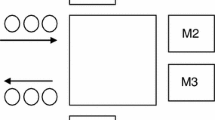Abstract
This paper presents the salient aspects of developing simulation-based metamodels for scheduling a typical flexible manufacturing system (FMS) operating in a tool-sharing environment. A discrete-event simulation model of the FMS is developed for the purpose of experimentation. Seven scheduling rules from the literature are incorporated in the simulation model for part scheduling decision. The performance measures considered for analysis are mean flow time, mean tardiness, and percentage of tardy parts. Simulation experiments have been carried out for various scenarios arising out of the settings of the mean interarrival time of parts for processing in the system and due-date factor. The simulation results are used to develop regression-based metamodels. These metamodels have been subjected to systematic analysis. The metamodels are found to offer a good prediction of the performance of FMS within the domain of their definition.
Similar content being viewed by others
References
Kleijnen JPC (1979) Regression metamodels for generalising simulation results. IEEE Trans Syst Man Cybern 9:93–96
Rao RV (2009) Flexible manufacturing system selection using an improved compromise ranking method. Int J of Ind Syst Eng 4(2):198–215
Stecke KE (1985) Design, planning, scheduling and control problems in flexible manufacturing systems. Ann Oper Res 3:3–12
Buyurgan N, Saygin C, Kilic SE (2004) Tool allocation in flexible manufacturing systems with tool alternatives. Robotics Comput Integrated Manuf 20:341–349
Hahn HS, Sanders JL (1994) Performance analysis of a LIM-based high-speed tool-delivery system for machining. Int J Prod Res 32(1):179–207
Gougar H, Cho S, Prabhu V (2002) High performance loading robot design for a tool-delivery system. Int J Prod Res 40(14):3401–3424
Liu J, MacCarthy BL (1993) The classification of FMS scheduling problems. Int J Prod Res 34(3):647–656
Sabuncuoglu I (1998) A study of scheduling rules of flexible manufacturing systems: a simulation approach. Int J Prod Res 36(2):527–546
Montazeri M, Van Wassenhove L (1990) Analysis of scheduling rules for an FMS. Int J Prod Res 28(4):785–802
Gray AE, Seidmann A, Stecke KE (1993) Decision models for tool management in automated manufacturing. Manage Sci 39(5):549–567
ElMaraghy HA (1985) Automated tool management in flexible manufacturing. J Manuf Syst 4:1–13
Gaalman GJ, Nawijn WM, Platzer LW (1987) Tool sharing in an FMS—a feasibility study. Eng Costs Prod Econom 12:107–115
Han MH, Yoon KN, Gary LH (1989) Real time tool control and job dispatching in flexible manufacturing systems. Int J Prod Res 27(8):1257–1267
Kashyap AS, Khator SK (1996) Analysis of tool sharing in an FMS: a simulation study. Comput Ind 30(1):137–145
Mohamed ZM, Bernardo JJ (1997) Tool planning models for flexible manufacturing systems. Eur J Oper Res 103(3):497–514
Roh HK, Kim YD (1997) Due-date based loading and scheduling methods for a flexible manufacturing system with an automatic tool transporter. Int J Prod Res 35(11):2989–3003
Peng C, Chen FF (1998) Real-time control and scheduling of flexible manufacturing systems: an ordinal optimization based approach. Int J Adv Manuf Tech 14:775–786
Lee KYD, GC CSK, Lim SK (2001) Tool requirements planning in a flexible manufacturing system with an automatic tool transporter. IEEE Trans Robot Automa 17(6):795–804
Chan FTS, Chan HK, Lau HCW (2002) The state of the art in simulation study on FMS scheduling: a comprehensive survey. Int J Adv Manuf Tech 19(11):830–849
Lee CS, Kim SS, Choi JS (2003) Operation sequence and tool selection in flexible manufacturing systems under dynamic tool allocation. Comput Ind 45:61–73
Haq NA, Karthikeyan T, Dinesh M (2003) Scheduling decisions in FMS using a heuristic approach. Int J Adv Manu Tech 22(5–6):374–379
Chan FTS (2003) Effects of dispatching and routeing decisions on the performance of a flexible manufacturing system. Int J Adv Manuf Tech 21:328–338
EIMekkawy TY, EIMaraghy HA (2003) Real-time scheduling with deadlock avoidance in flexible manufacturing systems. Int J Adv Manuf Tech 22:259–270
Chan FTS (2004) Impact of operation flexibility and dispatching rules on the performance of a flexible manufacturing system. Int J Adv Manuf Tech 24:447–459
Shnits B, Sinreich D (2006) Controlling flexible manufacturing systems based on a dynamic selection of the appropriate operational criteria and scheduling policy. Int J Flex Manuf Syst 18:1–27
Yu MC, Greene TJ (2006) A simulation analysis of controlling rules for flexible pull systems. Int J Manuf Res 1(3):314–331
Yu B, Popplewell K (1994) Metamodels in manufacturing: a review. Int J Prod Res 32:787–796
Baker KR, Betrand JWM (1981) An investigation of due date assignment rules with constraint tightness. J Oper Manage 1(3):109–120
Suresh KN, Sridharan R (2007) Simulation modeling and analysis of tool sharing and part scheduling decisions in single-stage multimachine flexible manufacturing systems. Robot Comput Integr Manuf 23:361–370
Welch PD (1983) The statistical analysis of simulation results. In: Lavenberg SS (ed) The computer performance modeling handbook. Academic, New York
Law AM, Kelton WD (2000) Simulation modelling and analysis, 3rd edn. McGraw-Hill International, New York
Banks J, Carson JS, Nelson BL, Nicol DM (2001) Discrete-event system simulation, 3rd edn. Pearson Education
Kleijnen JPC, Sargent RG (2000) A methodology for fitting and validating metamodels in simulation. Euro J Oper Res 120(1):14–29
Montgomery DC, Peck EA (1992) Introduction to linear regression analysis. Wiley, New York
Author information
Authors and Affiliations
Corresponding author
Rights and permissions
About this article
Cite this article
Suresh Kumar, N., Sridharan, R. Simulation-based metamodels for the analysis of scheduling decisions in a flexible manufacturing system operating in a tool-sharing environment. Int J Adv Manuf Technol 51, 341–355 (2010). https://doi.org/10.1007/s00170-010-2603-9
Received:
Accepted:
Published:
Issue Date:
DOI: https://doi.org/10.1007/s00170-010-2603-9




